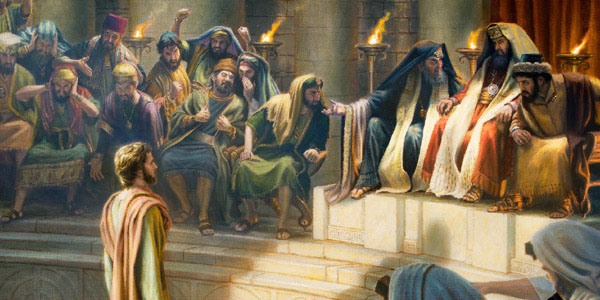Acts 7:1-16 (CLICK HERE FOR BIBLE VERSES)

Hi GAMErs,
Today’s passage is Acts 7:1-16. As usual, I encourage you to read the passage yourself first and see what you can glean with the Holy Spirit’s help, then read the GAME sharing below. Let’s go!
Acts 7:1-16 (NIV)
1 Then the high priest asked him, “Are these charges true?”
2 To this he replied: “Brothers and fathers, listen to me! The God of glory appeared to our father Abraham while he was still in Mesopotamia, before he lived in Haran.
3 ‘Leave your country and your people,’ God said, ‘and go to the land I will show you.’
4 “So he left the land of the Chaldeans and settled in Haran. After the death of his father, God sent him to this land where you are now living.
5 He gave him no inheritance here, not even a foot of ground. But God promised him that he and his descendants after him would possess the land, even though at that time Abraham had no child.
6 God spoke to him in this way: ‘Your descendants will be strangers in a country not their own, and they will be enslaved and mistreated four hundred years.
7 But I will punish the nation they serve as slaves,’ God said, ‘and afterward they will come out of that country and worship me in this place.’
8 Then he gave Abraham the covenant of circumcision. And Abraham became the father of Isaac and circumcised him eight days after his birth. Later Isaac became the father of Jacob, and Jacob became the father of the twelve patriarchs.
9 “Because the patriarchs were jealous of Joseph, they sold him as a slave into Egypt. But God was with him
10 and rescued him from all his troubles. He gave Joseph wisdom and enabled him to gain the goodwill of Pharaoh king of Egypt; so he made him ruler over Egypt and all his palace.
11 “Then a famine struck all Egypt and Canaan, bringing great suffering, and our fathers could not find food.
12 When Jacob heard that there was grain in Egypt, he sent our fathers on their first visit.
13 On their second visit, Joseph told his brothers who he was, and Pharaoh learned about Joseph’s family.
14 After this, Joseph sent for his father Jacob and his whole family, seventy-five in all.
15 Then Jacob went down to Egypt, where he and our fathers died.
16 Their bodies were brought back to Shechem and placed in the tomb that Abraham had bought from the sons of Hamor at Shechem for a certain sum of money.
On verses 1-16: Why is Stephen giving a speech to the Sanhedrin, Israel’s ruling council of elders, about the history of Israel? Remember that the Sanhedrin had accused Stephen of making false, blasphemous statements about Moses, about God (6:11), about the temple (6:13) and about the law of Moses (6:13). They accused Stephen of trying to subvert Judaism and advocate for a new religion, saying that Jesus would change the customs which the Jews had received from Moses (Acts 6:14).
In response to these charges, Stephen recounts the history of Israel, starting here with Israel’s founding fathers Abraham, Isaac, and Jacob. Stephen will later talk about Joseph, Moses, Joshua, David, Solomon and the prophets. In so doing, Stephen shows an excellent understanding of and an evident respect for his nation’s history.
Even more importantly, Stephen was trying to show that the gospel (good news) of Jesus Christ was not a new religion that opposed the law of Moses or a movement to subvert or destroy Judaism, but rather the gospel of Jesus Christ was the realization of God’s promises and plans for Israel’s founding fathers Abraham, Isaac and Jacob. Later Stephen will suggest that the gospel of Jesus Christ is also the fulfillment of the law of Moses and the words of the prophets.
Notice that Stephen starts his speech by addressing the Sanhedrin respectfully as “brothers and fathers” (v2), and speaks of Israel’s history in a way that the Sanhedrin could fully agree with. What can we learn from this? If you want to communicate effectively with your audience, like Stephen, be respectful and sensitive to where your listeners are at. Start by building common ground with your audience, speaking about things that your audience can relate to and agree with. Whether your audience is a crowd in a hall or an individual in your home, when you establish common ground with your audience, you build credibility and give yourself a foundation on which to communicate your more difficult points.
Father, please help me and Your church to build common ground with people that we need to reach with Your love, especially those who have yet to know You personally. In Jesus’ name, AMEN!
Copyright © 2022 Justin Lim. All rights reserved.

